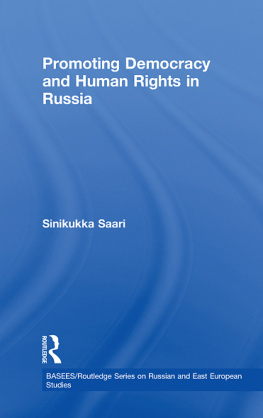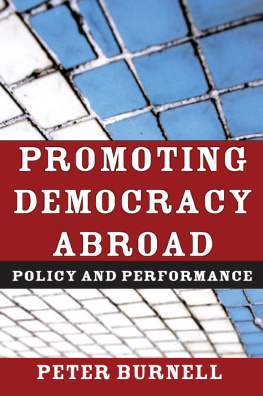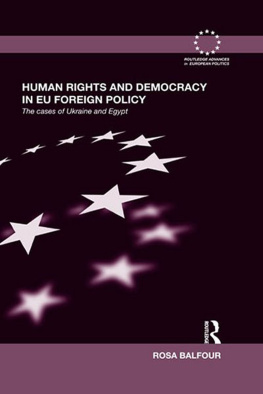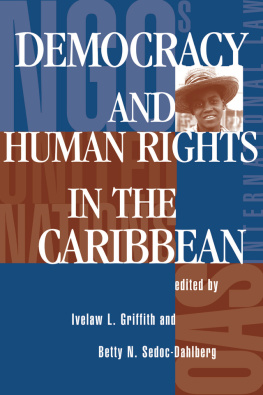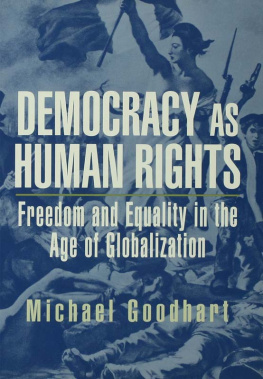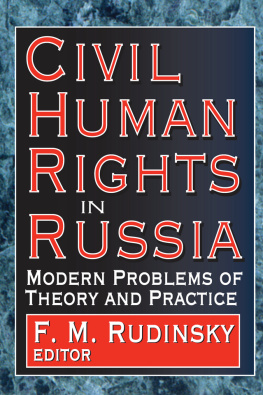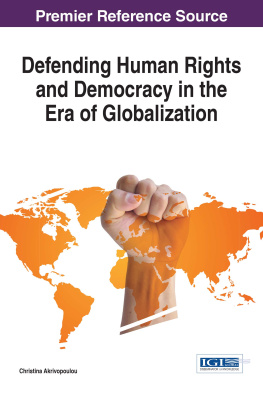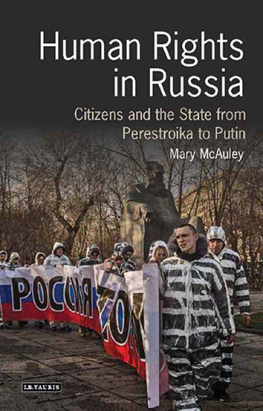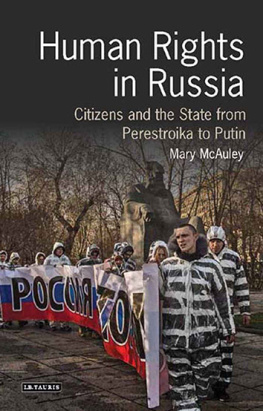Promoting Democracy and Human Rights in Russia
European regional organizations have spent significant amount of time, energy and money in supporting Russias transition towards the western liberal-democratic model since the end of the Cold War. This book explores the role the Council of Europe, European Union and Organisation for Security and Cooperation in Europe have played in Russias post-Soviet transition in the field of human rights and democracy.
The book argues that the organizations have played an important initial role in setting the reform agenda and in providing a general framework for interaction in the field of human rights and democracy. However, since the mid-1990s the impact of regional organizations has been slipping. Lately Russia has challenged the European human rights and democracy norms and now it threatens the whole framework for regional normative cooperation. Russias attitude towards western liberal order has become more assertive and its defiance increasingly concerted even internationally.
The main finding is that democracy and human rights promotion is not a one-way transference of norms like much of the theoretical literature and European practices presume. The Russian case demonstrates that the so-called target state can influence the norm promoters and the interpretation of the norms in a fundamental way. This is a finding that has significant implications both for theory and practice.
Sinikukka Saari is a researcher at the Finnish Institute of International Affairs. She earned her PhD at the London School of Economics.
BASEES/Routledge Series on Russian and East European Studies
Series editor:
Richard Sakwa, Department of Politics and International Relations, University of Kent
Editorial Committee:
Julian Cooper, Centre for Russian and East European Studies, University of Birmingham
Terry Cox, Department of Central and East European Studies, University of Glasgow
Rosalind Marsh, Department of European Studies and Modern Languages, University of Bath
David Moon, Department of History, University of Durham
Hilary Pilkington, Department of Sociology, University of Warwick
Stephen White, Department of Politics, University of Glasgow
Founding Editorial Committee Member:
George Blazyca, Centre for Contemporary European Studies, University of Paisley
This series is published on behalf of BASEES (the British Association for Slavonic and East European Studies). The series comprises original, high-quality, research-level work by both new and established scholars on all aspects of Russian, Soviet, post-Soviet and East European Studies in humanities and social science subjects.
1 Ukraines Foreign and Security Policy, 19912000
Roman Wolczuk
2 Political Parties in the Russian Regions
Derek S. Hutcheson
3 Local Communities and Post-Communist Transformation
Edited by Simon Smith
4 Repression and Resistance in Communist Europe
J. C. Sharman
5 Political Elites and the New Russia
Anton Steen
6 Dostoevsky and the Idea of Russianness
Sarah Hudspith
7 Performing Russia Folk Revival and Russian Identity
Laura J. Olson
8 Russian Transformations
Edited by Leo McCann
9 Soviet Music and Society under Lenin and Stalin
The baton and sickle
Edited by Neil Edmunds
10 State Building in Ukraine
The Ukranian parliament, 19902003
Sarah Whitmore
11 Defending Human Rights in Russia
Sergei Kovalyov, Dissident and Human Rights Commissioner, 19692003
Emma Gilligan
12 Small-Town Russia
Postcommunist livelihoods and identities a portrait of the Intelligentsia in Achit, Bednodemyanovsk and Zubtsov, 19992000
Anne White
13 Russian Society and the Orthodox Church
Religion in Russia after Communism
Zoe Knox
14 Russian Literary Culture in the Camera Age
The word as image
Stephen Hutchings
15 Between Stalin and Hitler
Class war and race war on the Dvina, 194046
Geoffrey Swain
16 Literature in Post-Communist Russia and Eastern Europe
The Russian, Czech and Slovak fiction of the changes 198898
Rajendra A. Chitnis
17 The Legacy of Soviet Dissent
Dissidents, democratization and radical nationalism in Russia
Robert Horvath
18 Russian and Soviet Film Adaptations of Literature, 19002001
Screening the word
Edited by Stephen Hutchings and Anat Vernitski
19 Russia as a Great Power
Dimensions of security under Putin
Edited by Jakob Hedenskog, Vilhelm Konnander, Bertil Nygren, Ingmar Oldberg and Christer Pursiainen
20 Katyn and the Soviet Massacre of 1940
Truth, justice and memory
George Sanford
21 Conscience, Dissent and Reform in Soviet Russia
Philip Boobbyer
22 The Limits of Russian Democratization
Emergency powers and states of emergency
Alexander N. Domrin
23 The Dilemmas of Destalinisation
A social and cultural history of reform in the Khrushchev Era
Edited by Polly Jones
24 News Media and Power in Russia
Olessia Koltsova
25 Post-Soviet Civil Society
Democratization in Russia and the Baltic States
Anders Uhlin
28 Russian Constitutionalism
Historical and contemporary development
Andrey N. Medushevsky
29 Late Stalinist Russia
Society between reconstruction and reinvention
Edited by Juliane Frst
30 The Transformation of Urban Space in Post-Soviet Russia
Konstantin Axenov, Isolde Brade and Evgenij Bondarchuk
31 Western Intellectuals and the Soviet Union, 192040
From Red Square to the Left Bank
Ludmila Stern
32 The Germans of the Soviet Union
Irina Mukhina
33 Re-constructing the Post-Soviet Industrial Region
The Donbas in transition
Edited by Adam Swain
34 Chechnya Russias War on Terror
John Russell
35 The New Right in the New Europe
Czech transformation and right-wing politics, 19892006
Sen Hanley
36 Democracy and Myth in Russia and Eastern Europe

